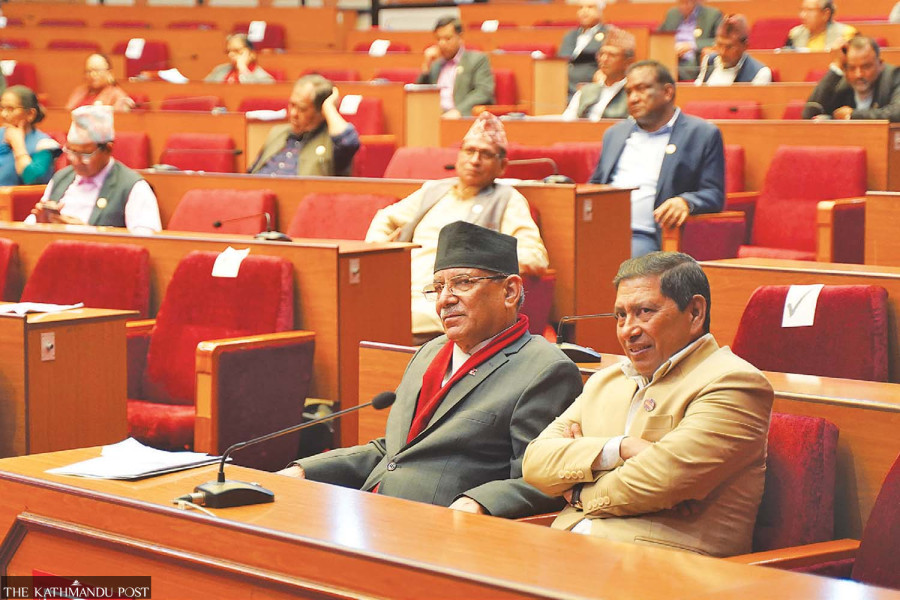National
National Assembly meeting deferred for lack of business
The federal parliament remains unproductive even as the country needs dozens of new Acts or amendments to the existing Acts as per the constitution.
Post Report
The meeting of the National Assembly called for Tuesday has been postponed till next week citing an unspecified reason.
The “special reason” that was given is nothing but a lack of business. While the country needs dozens of new Acts or amendments to the existing Acts as per the constitution, the federal parliament is without business. “The National Assembly meeting was postponed due to the lack of business,” Ek Ram Giri, spokesperson for the Parliament Secretariat, told the Post.
The first meeting of the House of Representatives elected by the November 2022 vote was held on January 9. In over nine months of commencement, it endorsed just one bill in addition to three mandatory bills related to the national budget. For months, the government has claimed that making Parliament effective is its utmost priority. It also has been making public statements for months that the federal education Act and federal civil service Act would be promulgated without delay.
However, only the bill related to the education Act has been registered in Parliament. It is uncertain when the civil service bill will land in the House. The lawmakers say the government is least concerned about making Parliament effective.
“This government is incompetent. Because of its incompetency, the Houses are suffering,” Khim Lal Devkota, a National Assembly member with expertise on federalism, told the Post.
The CPN-UML made the House defunct, obstructing it for around a month, demanding a high-level commission to probe the recent incidents of gold smuggling. However, even as the House obstruction was lifted with a deal on August 22, the government has failed to make it effective, said Devkota.
Several meetings between the ruling and opposition party leaders claimed to have been focused on making House proceedings effective look fruitless.
The Assembly last met on September 14 and is scheduled to convene on October 1.
The last meeting of the House of Representatives was held on September 15, with the next slated for Sunday. However, it has no concrete agenda other than rituals. For lack of bills to discuss, several House proceedings are now limited to conducting special and zero-hour sessions, along with occasional question-answer sessions.
As per the records from the Parliament Secretariat, 16 bills have been registered jointly in the House and the National Assembly. Some have been pending in the upper chamber for the last four years. Of them, 11 are under consideration in various House committees while one, after theoretical discussion in the House, awaits the registration of amendments by lawmakers. Four more have yet to enter the parliamentary process for deliberations and endorsement. However, none is ready to be presented to the full House for deliberations, according to Giri.
Appearing before the Assembly on September 11, Prime Minister Pushpa Kamal Dahal pledged to make the best out of the ongoing session. He also said that his government was working to pass the remaining laws to implement the constitution.
“The government has a primary responsibility to keep the House busy. However, it is also the responsibility of the Assembly chair and the House Speaker to take proactive measures,” said Devkota. “It is unfortunate that Parliament is ineffective while the country needs more laws to implement the constitution fully.”
A study by the Legislation Management Committee of the Assembly shows that only 111 laws among the 151 needed to implement the constitution promulgated in 2015 have been enacted. Still, 40 Acts need either significant amendments or replacement with new ones to bring them in sync with the statute.
As per the study, the three tiers of government had either to amend or replace 181 Acts necessary to implement the charter fully. Of them, 151 come under the jurisdiction of the federal government, 24 under the provinces and six under the local level.
The constitution had set two deadlines to prepare laws for its implementation. It was mandatory to pass laws related to fundamental rights within three years of the charter’s promulgation. The federal parliament endorsed the bills related to 31 fundamental rights a day before the constitutional deadline of September 19, 2018.
As per the statute, the Acts that contradict the constitution must have been revised within a year since the first meeting of the federal parliament on March 5, 2018. However, the House committee’s report suggests successive governments didn’t abide by the mandatory deadline.




 18.12°C Kathmandu
18.12°C Kathmandu













